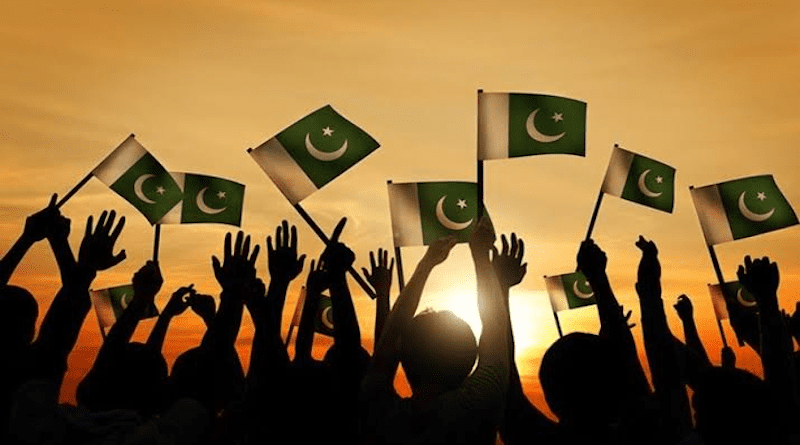International Youth Day: Pakistan’s Youth Empowerment Strategies – OpEd
By Yousma Gul
International Youth Day observed every year on August 12th by the United Nations (UN) as the day of awareness, was adopted by UN General Assembly (UNGA) via resolution supporting the suggestion made by the World Conference of Ministers Responsible for Youth in Lisbon.
The first Youth Day was officially celebrated in 1999 which served as a platform for social education, engaging young people in politics and monitoring resource allocation to deal with world issues, however, the UNGA started working actively to influence global youth as early as 1965. The international community agreed with the Declaration on Promoting the Ideals of peace, mutual respect, and understanding among People and among Youth. By identifying emerging leaders and providing them with resources to address global concerns, international stakeholders started dedicating time and resources to empower the youth. The day also recognizes the difficulties youth is facing and focuses on initiatives that aim to fix these challenges.
Pakistan is empowered with the fifth-largest youth in the world. According to a United Nations Population Fund report, Pakistan’s 200 million-strong population is made up of 63% youth, primarily under the age of 30—roughly two-thirds of the entire population. Young Pakistanis can significantly contribute to the growth and development of their country and a higher percentage comprises of talented individuals. It is a nation where creative flair surpasses expectations, where academic records are set and then broken, and where Nobel prizes are won, all at a very young age. The youth Naila Kiani (first Pakistani woman to climb seven peaks above 8,000 meters), Amir Hamza Panjari (awarded 7 international medals at the World Scholar’s Cup competition 2023), Muneeba Ali (first Pakistani and sixth woman in the World to score a WT20l century), Shanzaib Rind (first Pakistani to win ‘Karate Combat Pro Fight in, USA on 2nd April 2023), Hamza Khan (Current Squash National Gold Medalist), Doctor Hafiz Muhammad Waleed (Worldwide record holder of securing 29 Gold Medals in MBBS), lqra Bisma (awarded Diana Award role of Honour 2022) and many more have been instrumental in the past for projecting Pakistan’s soft image at international level. A greater proportion of young people is considered to be a major economic driver for growth and progress.
According to Pakistan’s armed forces, the development and education of young people are of utmost importance. Pakistan army has launched a number of programs focusing on Pakistani youngsters. As a resilient force for Pakistan, Pakistani youngsters are quite capable and responsible for overcoming any challenges and the war of ideas. In order to mobilize their energies for societal advancement, army has regularly engaged them at various levels. The Army Public School and College System (APSCS) is a major contributor to national integration because it has an extensive footprint and provides uniform, high-quality education at affordable prices to students from a variety of socioeconomic backgrounds. With 4000 students enrolled, 80% of whom come from non-military backgrounds, the Pakistan Army has created 25 special education institutions around Pakistan as part of a charitable drive for youngsters with disabilities. In addition, Inter-Services Public Relations (ISPR) offers a structured forum for Pakistani youth to interact with subject matter specialists as part of its yearly internship program, which lasts for six weeks.
Similarly, on the governmental level, there are a number of youth initiatives that give them the opportunity to utilize their potential and earn money by utilizing their talent. Among such programs, the Special Investment Facilitation Council (SIFC) is one of those initiatives that will serve as a ‘Single Window’ for multi-domain cooperation which is expected to create jobs and livelihoods for the youth.
While Pakistan always stands with its youth by providing them different opportunities, India on the other hand, has a vicious history of suppressing the youth of IIOJK which makes up 2.5 million of their population. The targeted killings of innocent Kashmiri youth by Indian forces have been constantly reported in IIOJK which have created a dreadful atmosphere across the valley. For years, international human rights organizations have stated that Indian troops intimidate, control and suppress the IIOJK youth with physical torture and unjustified arrests. UN Human Rights Council (UNHRC) stated, “There have long been persistent claims of Human Right Violation’s (HRVs) by Indian security forces IIOJK particularly against Kashmiri Youth.” As a State party to the International Covenant on Civil and Political Rights, which prohibits HRVs under any circumstances (Article 7), India is obliged to ensure that no person is “subjected to cruel inhumane or degrading treatment, punishment or targeted killings”.
A society’s basic survival depends on the youth and their engagement, not just for technological advancement, economic growth, and political dominance and building a sustainable nation-state system in the long run. While Pakistan continues to take its youth on the path of progression, It also acknowledges the urgency with which the international rights groups and organizations must uphold the rights of Kashmiri youth to live a better future.

